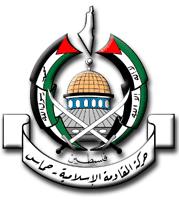
Hamas (حماس), acronym of Harakat al-Muqawama al-Islamiyya (Arabic: حركة المقاومة الاسلامية, literally "Islamic Resistance Movement" and Arabic for 'zeal'), is the largest Palestinian Islamist movement. Hamas is engaged in social welfare activities as well as in violent activities to achieve its political goals. It is listed as a terrorist group by the European Union, Canada, the United States, and Israel; the U.S. State Department provides a list of terrorist actions by Hamas.
Created in 1988, Hamas is ideologically connected to the Muslim Brotherhood movement in Egypt, seeks to establish an Islamic theocracy the area that is currently Israel, the West Bank, and the Gaza Strip. In pursuit of this end, Hamas affirms a right to engage in armed struggle. Abdel Aziz al-Rantissi, a co-founder of Hamas, reportedly stated that the movement's goal is "to remove Israel from the map". While during the election campaign Hamas dropped its call for the destruction of Israel from its manifesto, several Hamas candidates insist that the charter is still in force and often called for Israel to be "wiped off the map" in their campaign speeches.
In the Palestinian Legislative Council elections of January 2006, Hamas won 42.9 % of the vote, which gave it a parliamentary majority with 74 of the 132 seats. This outcome has been seen as a major setback for foreign governments attempting to mediate the ongoing Israeli-Palestinian conflict. The United States has said that it will not deal with Hamas until it renounces its support of suicide bombings and terrorism and accepts Israel's right to exist, in direct contradiction to Hamas' charter as currently written. At the same time, Israeli president Moshe Katsav and Israel's ex-prime minister Shimon Peres have both said that if Hamas will accept Israel's right to exist and give up terror, Israel should negotiate with the organization.
Its attacks targeting Israeli civilians and other human rights abuses have been condemned by the United Nations, Commission on Human Rights, Amnesty International and Human Rights Watch. During the second Intifada, the Al-Aqsa Intifada, Hamas claimed responsibility for most of the suicide bombings that took place in Israel. Hamas has observed a respite since an attack on the Israeli southern town of Beersheba in August 2004 (15 dead, 125 wounded) and has violated it once since that time in an attack on the same bus station in Aug 2005 (7 wounded).
Founded in 1987, Hamas won a majority over the ruling Fatah party during the January 2006 Palestinian legislative election. As an Islamic party, it is ideologically opposed to the existence of Israel and has denounced the 1993 Oslo Accords, the foundation of the failed peace process, as a betrayal of God's will. However, in 2004, Hamas offered a 10 years truce, or hudna, in exchange for a complete withdrawal from the occupied territories, thus accepting de facto Israel existence as determined by its 1967 borders. During the second Intifada, Hamas spearheaded the violence through the years of the Palestinian uprising. Hamas is well funded and known to make generous payments to the families of suicide bombers.
The organization is particularly popular among Palestinians in the Gaza Strip, though it also has a following in the West Bank, and, to a lesser extent, in other Middle Eastern countries and throughout the Palestinian diaspora. Based since its 1987 creation on a mix of social, political and military actions, Hamas' popularity stems in part from its provision of welfare and social services to Palestinians in the occupied territories, such as through the building of schools and hospitals. It is also well regarded by the Palestinians for its efficiency and perceived lack of corruption, in particular compared to Fatah.
On January 26, 2006, the Palestinian Central Elections Committee announced that Hamas had won a majority of seats in the Palestinian Legislative Council (PLC), defeating the ruling Fatah party. According to the preliminary results the List of Change and Reform obtained 42.9 % of the vote and 76 of the 132 seats. Palestinian Prime Minister Ahmed Qurei and his cabinet resigned, leaving Hamas to form a new government. After the victory, Israeli Human Rights organizations have called on Hamas to stop its terror campaign against civilians and to avoid using violence as a tool to achieve a political solution. The US Bush administration and the European Union have threatened to cut financial aid to the Palestinian Authority if Hamas members hold ministerial positions. President Vladimir Putin however said that Russia would not support any efforts to cut off financial assistance to the Palestinians.
No comments:
Post a Comment